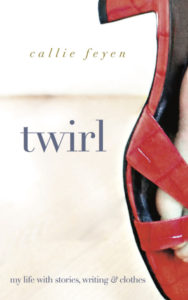I don’t think there’s anything set in stone about the need to include metaphors in poetry. I have not heard of any conference with keynote speakers setting mandates and objectives on metaphor’s necessity. (Can you even imagine?)
However, a poet’s ability to use two unlike things to express something that feels otherwise unsayable is something I love about reading poetry.
“Remember how your mother took you gently up, then folded up the ocean,” Jeanne Murray Walker writes in “Notes To Yourself,” a poem found in Pilgrim, You Find the Path by Walking. A mother cannot fold up the ocean, you might think. How can I remember something that did not happen? Except maybe you have a memory of your mother or a mother figure picking you up gently. And of course it wasn’t the ocean she folded up, but perhaps you know what it is to face something so vast, so mysterious, so strong it could pull you away in an instant. It would take someone equally strong and vast and mysterious to fold it up.
So the poet continues, the mama folds the ocean and she “tucked it safely under her arm, swept the beach into the jar / How long it’s kept. It’s kept.”
And maybe you’re thinking the poet is referring to the jar of saved sand, and that could be, but what about the ocean tucked safely under the mother’s arm? Could it be that the ocean stands for all a mother holds and protects and offers? Could the ocean be a placeholder for how we might’ve experienced our mothers when we were younger? Perhaps now that we are older, we can take that jar, open it, and let the ocean out.
Try It
A metaphor is a figure of speech writers use to compare two unlike things. The metaphor’s power is its ability to express something in the unlikely comparison. Readers are given the ability to better feel the story(or poem), which means we become more empathetic.
This week write a poem with a metaphor in it. If you can, use water or sand as your ingredient.
Featured Poem
Thanks to everyone who participated in last week’s poetry prompt. Here’s one from Jenna Brack we enjoyed:
Swimming Lessons
You stood guard
behind the chain-link fence
as we treaded, kickboarded,
backstroked, flip-turned, dove
into shivering pools on steamy mornings,
our water-soaked complaints falling
onto your dry hair—
a symbol of the summer
you nearly dipped beneath
the lake’s surface
and never became our mother.
I crossed an ocean
once, called to confess
my shoulders had turned
the color of your rouged cheeks.
I heard you sigh
from behind the fence, still
holding the swim bag
with my forgotten sunscreen.
I have left some things behind,
but when water surrounds
my body, I rehearse the kicks,
strokes, and turns you never learned
but left behind for me.
Photo by G. Lamar Creative Commons, via Flickr. Post by Callie Feyen.
Browse more poetry prompts
Twirl is writing magic.

– Tracy Erler
- Poetry Prompt: Courage to Follow - July 24, 2023
- Poetry Prompt: Being a Pilgrim and a Martha Stewart Homemaker - July 10, 2023
- Poetry Prompt: Monarch Butterfly’s Wildflower - June 19, 2023

Richard Maxson says
Do Not Despair
The trace of pearl that remains
in the bulk of you will fail, in the curl
it will shatter, the curl can drown you,
or you will lose your footprints
in the moist sand of nostalgia.
Your tears have made an ocean
where pirates have stolen everything
from you, and steal it now.
So walk.
There is only salty water behind you;
love may not come from what you love;
you cannot always choose
the doorway that opens your life.
martin gottlieb cohen says
Tanka
Aqaba beachfront * Kaminoku (upper verse)
how the stillness suspends
air * Kakekotoba (pivot/bridge)
on a G string
the sound’s back and forth ache *Shimonoku (lower verse)
https://youtu.be/DRfhcvKvn0E
*Kaminoku (upper verse)
Tried to capture the suffocating dry heat that makes everything apart from each other.
*Shimonoku (lower verse
The sound of Bach’s music as a metaphor to love making
martin gottlieb cohen says
Sorry I left out some information;excuse the duplicate:
Tanka
Aqaba beachfront * Kaminoku (upper verse)
how the stillness suspends
air * Kakekotoba (pivot/bridge)
on a G string
the sound’s back and forth ache *Shimonoku (lower verse)
https://youtu.be/DRfhcvKvn0E
*Kaminoku (upper verse)
Tried to capture the suffocating dry heat that makes everything apart from each other.
*Shimonoku (lower verse
The sound of Bach’s music as a metaphor to love making
* Kakekotoba (pivot/bridge)
Tried to find a word in English with multiple meanings and spelled the same, Homonym.
Connecting the obsessive heat with the tactile pleasure of both the music and lovemaking.